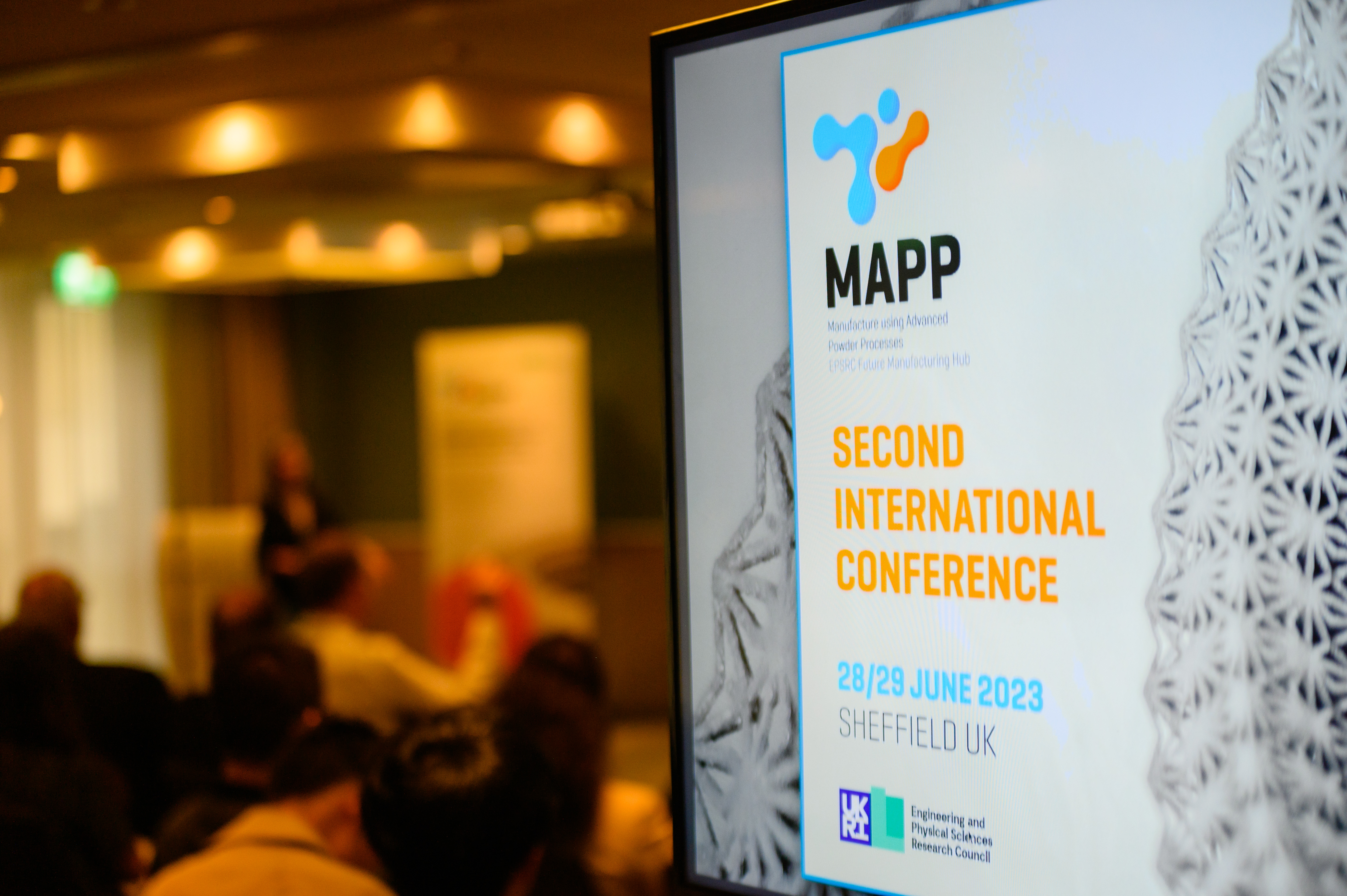All News /
News:
New £33M Additive Manufacturing (AM) research programmes AIRLIFT and DAM to inject new technology and accelerate AM industrialisation
20 / 06 / 19
MAPP is part of two ground-breaking collaborative additive manufacturing (AM) research programmes, AIRLIFT and DAM.
The University of Sheffield is pooling the knowledge of world-leading experts from across its Faculty of Engineering, Advanced Manufacturing Research Centre (AMRC) and MAPP to partner in the £33m projects which will focus on new technologies and Industry 4.0 processes to revolutionise product design in the aerospace industry
Meso-structure produced using additive manufacturing technologies offer unique design freedom enabling complex designs where additional functionality has been integrally built into a part that traditionally only had a mechanical function.
Combining this with the development of additive manufacturing capability towards right first time production through improved simulation, control and machine robustness will lead to a step change in manufacturing.
One of the main challenges faced by the aerospace industry is the environmental impact, so a key focus for the sector is the development of technologies that will reduce this impact from cradle to grave. Businesses throughout the supply chain are investigating:
- Methods of lightweighting components to make aircraft more fuel efficient and with future electrification in mind;
- Manufacturing techniques that are less resource intensive;
- Sustainability, through the use of alternative and recycled materials.
DAM (Developing Design for Additive Manufacturing) is a £14M programme aimed at developing the next generation of design tools and methods for additive manufacturing using a data driven, material centric approach.
AIRLIFT (Additive Industrialisation for Future Technology) is a £19M technology industrialisation programme that uses Industry 4.0 and simulation competencies to enhance both laser metal deposition with wire (LMD-w) and powder bed AM technologies.
DAM and AIRLIFT are intrinsically linked together and complement each other; with DAM developing the process and AIRLIFT developing the capability to manufacture the final product. The projects are focused on making AM serial production ready at high rates and exploring how AM can revolutionise product design for high-value, high-complexity product manufacture.
The consortium includes academics and engineers from Sheffield’s Departments of Materials Science and Engineering, Automatic Control and Systems Engineering, and Electronic and Electrical Engineering for DAM, and brings in experts from the Advanced Manufacturing Research Centre (AMRC) for AIRLIFT.
The Department of Materials Science and Engineering provides the knowledge of alloy development, metals processing techniques, analytical and computational process modelling and advanced materials characterisation, along with state-of-the-art equipment available through MAPP EPSRC Future Manufacturing Hub and Royce@Sheffield.
The Department of Automatic Control and Systems Engineering contributes expertise in process monitoring and control which are critical in ensuring right-first-time manufacture. In this project, this is to be achieved via data-driven machine learning methods and algorithms. The ability to deliver bespoke materials properties through real-time control, is an exciting prospect for manufacturers.
“AM is a strategic technology for the Aerospace Industry that will fundamentally change the way we design and manufacture aircraft. AM enables us to control material characteristics enabling benefits in terms of product performance, cost and environment. With AIRLIFT and DAM and the Global Technology Centre in Bristol, GKN Aerospace will further develop and industrialise additive manufacturing within the UK industrial and scientific eco-system.”
The Department of Electronic and Electrical Engineering will focus on innovative high resolution thermal and spectroscopic imaging technologies, which enable real-time process monitoring and closed-loop feedback within the process systems.
The AMRC has a global reputation for developing the translational research and innovation capabilities that strengthen the UK’s offer to the high-value manufacturing sector. Its expertise lies in developing advanced manufacturing techniques and translating them to a wider industrial market, leading to process maturation.
"It's not uncommon for our departments to work together to solve research problems" comments MAPP Director Professor Iain Todd, GKN/Royal Academy of Engineering Research Chair in Additive Manufacturing and Advanced Structural Metallics at the University of Sheffield, "Our ability to provide the expertise, skills and resources needed to address current and future manufacturing issues, all within the same institution, makes us the ideal partner for businesses, like GKN Aerospace, who want to lead the way in sustainable manufacturing."
Gavin Hill, who is leading on this for the AMRC, said: “These two projects are critical to the future of flight. With our Tier One Partner GKN taking the lead role, we will be working with research colleagues across the university with expertise in materials, process monitoring and additive manufacturing to help shape the future of flight.
The aviation sector is under immense pressure to reduce its impact on climate change and global warming. This requires the development and use of novel materials, processes and manufacturing methods to create a new generation of lighter more fuel efficient aircraft, with the ultimate goal being hybrid and perhaps fully electric powered flight.
These projects are perfect examples of how industry and university R&D collaboration is addressing the grand challenges identified in the government’s Industrial Strategy – the future of mobility, clean growth, artificial intelligence and machine learning.”
The technology developed in these projects will be applicable across a range of aerospace applications, from engine components to aerostructure parts.
DAM and AIRLIFT also involve industrial partners Autodesk, Siemens Digital Industries Software and CFMS (The Centre for Modelling and Simulation). Forty highly specialised engineers and operators from universities, research institutes and industry will work together on the programmes, which will be based out of GKN Aerospace’s recently announced £32m Global Technology Centre in Bristol.
DAM and AIRLIFT build on GKN Aerospace’s global AM expertise and infrastructure as well as on previous successful ATI programmes. Innovative simulation solutions, Industry 4.0 processes and new design tools and methods add real value to aerospace customers by speeding up and customising product design and development, while maintaining the best possible quality.
Russ Dunn, CTO and Head of Strategy, GKN Aerospace explains: “AM is a strategic technology for the Aerospace Industry that will fundamentally change the way we design and manufacture aircraft. AM enables us to control material characteristics enabling benefits in terms of product performance, cost and environment. With AIRLIFT and DAM and the Global Technology Centre in Bristol, GKN Aerospace will further develop and industrialise additive manufacturing within the UK industrial and scientific eco-system. The Aerospace Technology Institute (ATI) is an incredibly valuable resource for UK aerospace and we are delighted they are supporting this project to help the UK stay at the forefront of this exciting and emerging technology as part of the UK’s industrial strategy.“
Dr. Simon Weeks, Chief Technology Officer of the Aerospace Technology Institute, says: “The ATI is delighted to support GKN Aerospace’s AIRLIFT and DAM projects. These exciting projects will progress additive manufacturing technology, extending the capabilities for largescale AM component manufacture for the UK. This offers great opportunities for efficient future aircraft structures with tailored properties as well as valuable material and energy savings. These investments in GKN’s new Global Technology centre will strengthen the UK’s position in AM and establish a route to industrialise Laser Wire Deposition for aerospace.”
More:
News
-

-
Exploring STEM - 4th May 2023
The MAPP Stand was a hit at the Exploring STEM for Girls event at the Octagon on the 4 May 2023.<...

